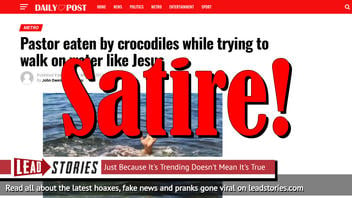
Did a pastor get eaten by crocodiles while trying to walk on water like Jesus? No, that's not true: The story is a work of satire, but it has been making the rounds online for almost three years.
The latest claim being shared came from an article published by the Nigerian Daily Post on May 13, 2017, titled "Pastor eaten by crocodiles while trying to walk on water like Jesus - Daily Post Nigeria" (archived here). It opened:
A pastor who tried replicating the Biblical story of Jesus Christ walking on water has been eaten by crocodiles.
The pastor, identified as Jonathan Mthethwa, of the Saint of the Last Days Church, tried the demonstration at a river known as Crocodile River.
Mthethwa, from a local church in White River Mpumalanga died Saturday morning trying to demonstrate the biblical miracle to his congregants.
According to The Herald Zimbabwe, he drowned into the Crocodile River and was seen by his church members getting eaten by 3 crocodiles.
Users on social media only saw this title, description and thumbnail:
Pastor eaten by crocodiles while trying to walk on water like Jesus - Daily Post Nigeria
A pastor who tried replicating the Biblical story of Jesus Christ walking on water has been eaten by crocodiles. The pastor, identified as Jonathan
Over the years, the post has been revised or republished word-for-word, a technique known as "article spinning." It is a completely fabricated tale, however. There are no credible reports of a Zimbabwean pastor attempting to emulate Jesus by carrying out the Biblical miracle of walking on water.
Before this story was published, a different website, National News Bulletin, made the original claim. The site is no longer available, though the Internet Archive Wayback Machine captured an image from it on February 24, 2017. At the bottom of the story is this line:
Pure African Satire.
As is so often the case, other websites have copied the story, but they dropped any reference to the article being satirical and presented it as real news.
On May 14, 2017, The Daily Mail published an article exposing "the truth behind the story that swept the Internet." The report detailed how the mainstream newspaper, The Nigerian Daily Post, gave the story worldwide attention, even though it was untrue. However, it wrongly attributed the story to the Zimbabwe Herald, which never ran the story.

















